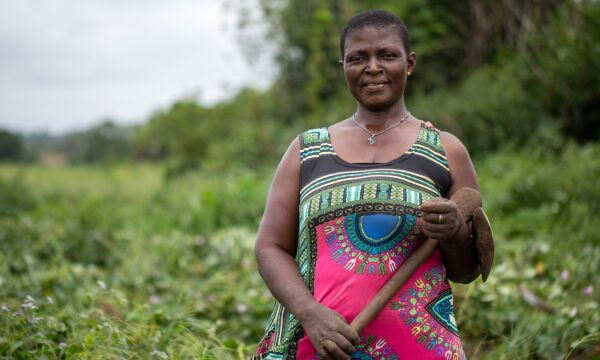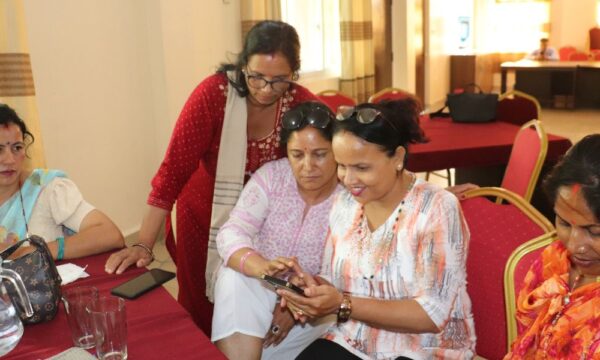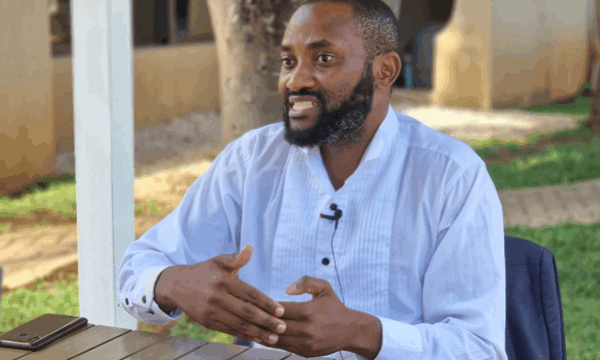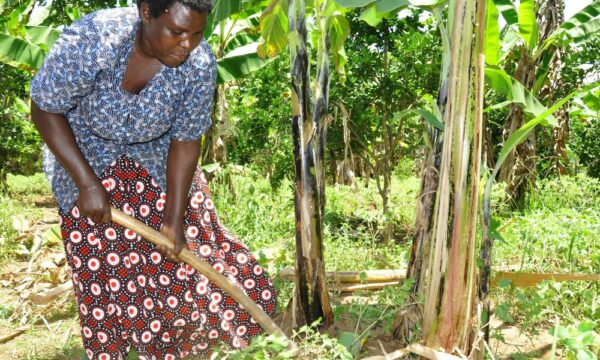How PlantwisePlus is championing gender equality in agriculture through GTWGs
Gender Technical Working Groups play a vital role in advancing equality in rural communities. Women in villages often have less access to knowledge, resources and power than men. They are less likely to be able to attend agricultural training. In addition, many struggle to secure credit and much-needed agricultural inputs. Moreover, social norms often confine them to caregiving and labour roles. As a result, they are unable to reach their full potential.
This inequality not only affects rural women. It impacts entire communities, too. Women’s empowerment benefits everyone. When women succeed, societies succeed. The UN estimates that if women had the same agricultural opportunities as men, they could produce enough food to feed an additional 100-150 million people. Gender equality is about fairness, but it is also more than that. It is essential for economic growth and food security.
Many organizations work on gender equality in agriculture. Nevertheless, systematic collaboration does not always occur. Academia, civil society, government, non-profits and the private sector all play essential roles in gender equality. However, they do not always share knowledge in common fora. This is where Gender Technical Working Groups play an important role. They bring together diverse stakeholders. Furthermore, they drive collective action and lasting change.
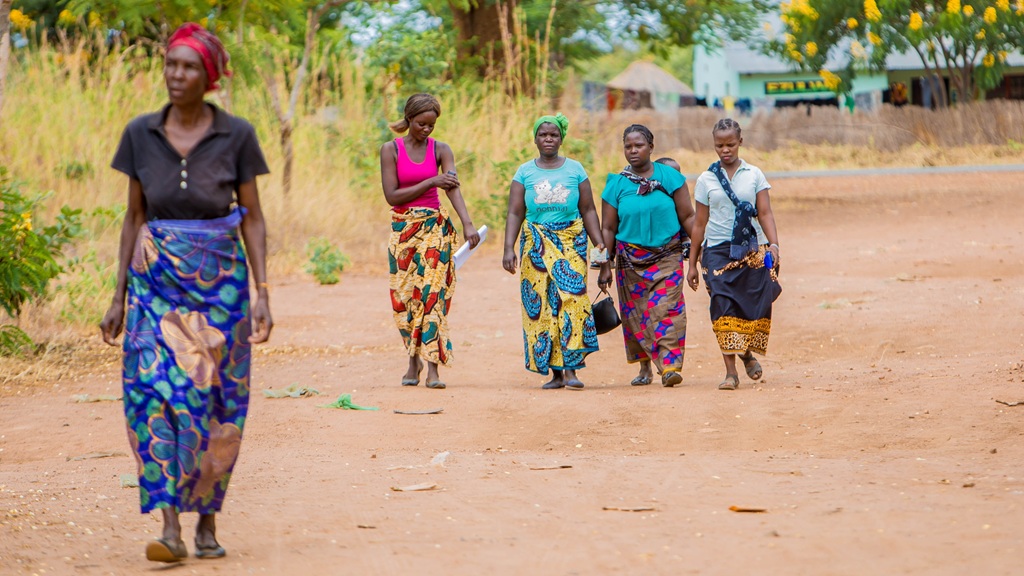
What are the PlantwisePlus Gender Technical Working Groups?
How were PlantwisePlus Gender Technical Working Groups established?
In 2022, CABI, through PlantwisePlus, piloted Gender Technical Working Groups. These early groups emerged out of validation workshops held on studies about Gender Rural Advisory Services (GRAS) in Ghana and Pakistan. The groups worked with stakeholders to promote gender equality in agriculture. They served as advocacy platforms for decision-making, knowledge-sharing and research.
This is because such services often face challenges. For example, most agricultural extension officers are men. This can discourage women from participating. Moreover, many rural advisory services lack clear gender policies. Collaboration through the Technical Working Groups helped to overcome these hurdles. For example, the groups helped to strengthen GRAS by finding solutions for equitable agriculture services provision. They provided training to help regional gender coordinators apply new strategies. They also supported lobbying, policy reviews and systemic change. Using a participatory approach, they bridged gender gaps in agriculture. This helped to empower women and increase their productivity.
Extending the Gender Technical Working Groups to more countries
The groups in Ghana and Pakistan were a great success, and their impact led PlantwisePlus to develop a new model. This novel approach was based on best practices and lessons learned. It became the Gender Technical Working Groups. The goal is to expand them across all PlantwisePlus countries. Between 2025 and 2030, the programme will work with local stakeholders to establish more groups. In March 2025, Zambia launched its working group. Bangladesh will followed April. The groups have three implementation phases.

Phase 1: Establishment phase (years 1 and 2)
- Capacity strengthening: Train members, extension agents, stakeholders (Training-of-Trainers-focused for knowledge cascading)
- Knowledge transfer: Document and share best practices on gender inclusivity
- Partnership development: Build collaborations between local and international partners

Phase 2: Gradual phase-out (years 2 and 3)
- Reduced CABI involvement: Shift leadership to GTWG members
- Technical support: Remote assistance, mentoring, and monitoring
- Financial sustainability: Local funding, donor support, inclusion in annual development plans

Phase 3: Full transition (year 4)
- Local leadership: Ownership transferred to national members
- Self-sustaining mechanisms: Revenue streams, user fees, rotation-based meetings
Evaluation and learning: Document lessons and successes
What will the Gender Technical Working Groups do?
The Gender Technical Working Groups will perform a range of roles. Firstly, they will act as platforms to bring together stakeholders. Coordination with relevant stakeholders is a critical part of the groups’ function. Dialogue will be key. Members will work proactively to unite people working in gender awareness.
The groups will also form a hub for stakeholders to take concerted action at a local level. They will encourage engagement in communities. For example, the groups will support training in gender awareness. Working group members and extension services will provide gender-sensitive training to farmers.
Support on policy issues is also critical. The groups will help members to advocate on policy matters. This will help to ensure gender integration within government projects. For example, members will advocate for more equitable gender representation in GRAS.
From a technical perspective, the groups will also provide assistance. Specifically, they will support field-based PlantwisePlus clinics with practical activities. For example, they will give special assignments to members. They will also collaboratively design action plans. Technical assistance will be given in order to design standardized reporting tools. These tools will support women’s economic empowerment and skills development. Finally, the groups will monitor and review progress towards agreed goals and targets.
Membership and structure
Who will join the Gender Technical Working Groups?
The Gender Technical Working Groups will be collaborative and based on participatory decision-making. Sector-specific senior technical experts will be invited to join as members. The relevant partners of CABI’s PlantwisePlus programme will also participate. This includes government ministries and extension departments. Co-chairs, one from CABI and another from the country’s government extension department or national gender commission, will lead the groups.
Other members will include civil society organizations and UN agencies. In addition, local and international non-governmental organizations will be invited to participate, along with universities and the research community. The groups will meet quarterly or, if needed, on a more regular basis. Generally, groups will follow one structure. However, some groups may look slightly different depending on the local context.
Looking to the future – how will the groups create local ownership?
Sustainability forms a core component of the Gender Technical Working Groups. The aim is for local partners to continue running the groups independently of PlantwisePlus. CABI will facilitate the handover process, which it should complete between years three and four. Ministries will spearhead agricultural interventions. Gender mainstreaming in specific countries will take the initiative forward. CABI will provide ongoing technical support after year four.
This exit strategy ensures a gradual transition. It strengthens capacity and skills. Moreover, it secures long-term sustainability through locally driven leadership. Various exit strategy indicators will signal when the groups have become sustainable. For example, local members are leading the groups’ initiatives. Also, sustainable funding mechanisms will be established. Continued gender-inclusive extension services will be in place.
This strategy will encourage all members to participate in the project’s process. It will increase their sense of responsibility in relation to the groups. Furthermore, it will help to promote integrity and transparency. Creating project ownership and planning a sustainability strategy are critical Together, they will help to ensure the groups’ long-term effectiveness.
Gender Technical Working Groups are important because they help to ensure that women and men are treated fairly. Experts in these groups are coming together to share ideas. By studying the facts, they can identify challenges and find ways to overcome them. Together, they help the many people working on gender equality to collaborate more effectively. This kind of partnership can help us to achieve goals, including SDG5 on Gender Equality. Ultimately, the groups can help to improve the livelihoods of women and men farmers living in rural communities.
PlantwisePlus GTWGs in action
The GTWG in Pakistan organized a laboratory tour for its members, during which attendees visited CABI’s Trichogramma rearing facility (TRF) in Mardan, northwest Pakistan, which rears parasitic Trichogramma wasps. These beneficial insects help keep pest numbers down, thereby protecting crop yields. During the visit, members gained valuable insights into gender-sensitive extension services and pest control. Knowledge sharing is an integral part of the group’s work.
Read the blog: Empowering women farmers in Pakistan with pest control knowledge.
More on gender in agriculture
5 reasons to increase gender-equal education in agriculture
Gender equality and youth inclusion: ten focus areas for impact
Overcoming social norms to boost women farmers’ access to agricultural advisory services
Women are not just farmers’ wives: overcoming stereotypes of women in agriculture
PlantwisePlus gratefully acknowledges the financial support of the Directorate-General for International Cooperation, Netherlands (DGIS); European Commission Directorate General for International Partnerships (INTPA); UK International Development from the UK government; and the Swiss Agency for Development and Cooperation (SDC).
Related News & Blogs
Advancing gender-inclusive agricultural advisory services in Bangladesh
In Bangladesh, agriculture forms the backbone of rural communities. It employs nearly two-thirds of the workforce, many of whom are women. However, the sector faces significant threats from plant health challenges, including devastating crop pests such…
15 October 2025

